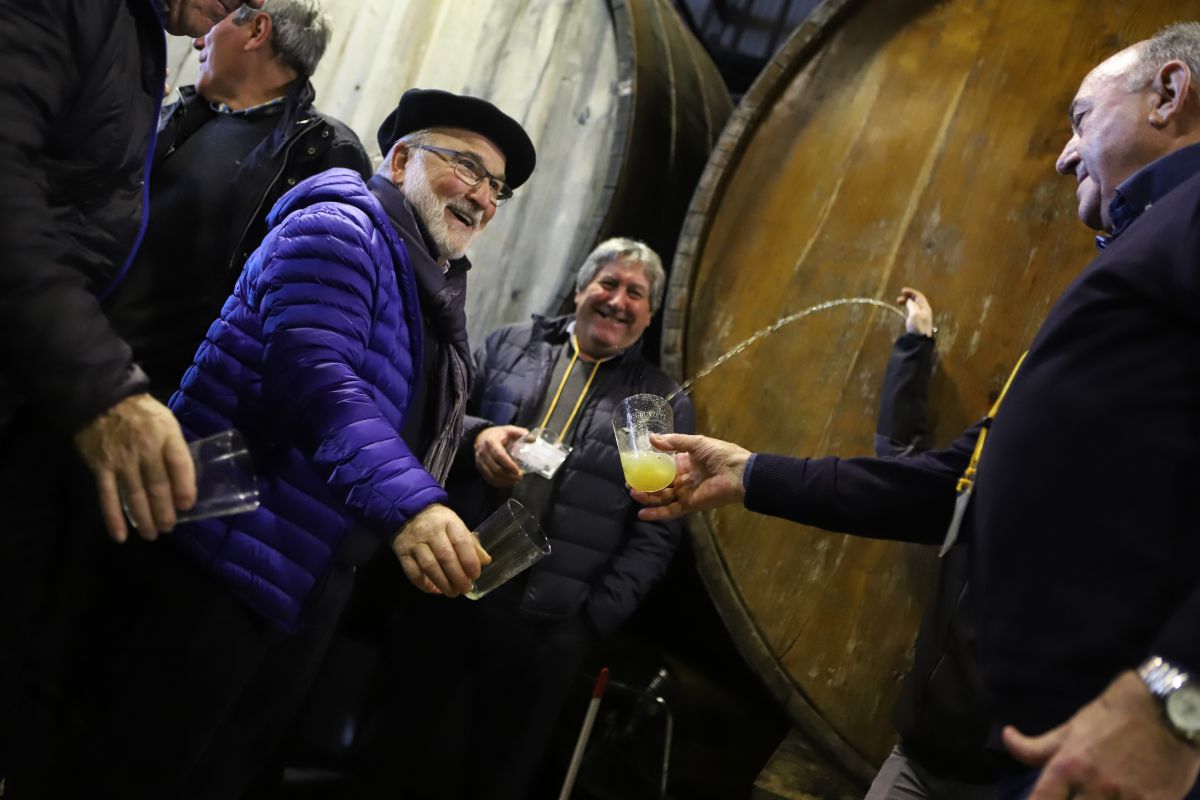Whenever I visit the Basque Country, my entire time ends up being centered around dinner tables abounding with food and drink. I swear I always find 10 pounds that I never manage to lose after each visit. Food and drink are such central parts of Basque life that it is hard to imagine a Basque fiesta or gathering without them. And while Basque cuisine has a justified world-renowned reputation for its excellence, no Basque meal would be complete without the accompanying drink. Fortunately, the Basque menu also has a number of unique beverage choices to offer.

- Basque sagardoa, or hard cider, is dry and still, in contrast to the sweeter and sparkling versions found in many other places. Cider has been made in the Basque Country since at least 1014, when an envoy of Sancho III of Nafarroa mentions it. Cider and apples were such a pervasive part of Basque life that, in the 16th century, the infamous witch persecutor Pierre de Lancre called the Basque Country “the land of the apple.” Cider was such an integral part of life that the fueros of Gipuzkoa banned the import of foreign cider, unless all of the native cider had been drunk.
- Maybe the most controversial Basque drink is kalimotxo. This half-and-half mixture of red wine and coke always brings an initial shudder of revulsion to anyone I mention it to, but most who try it are pleasantly surprised. Though mixing wine and coke has a long history, it wasn’t until 1972 when a group of friends in charge of the drinks at a fiesta in Getxo coined the word kalimotxo that it really took off. They had 2000 liters of bad wine they had to sell and they found mixing it with coke worked wonders. And today, we have kalimotxo!
- Txakolin is a “somewhat sour light wine” according to the Royal Academy. Until the 1980s, txakolin was primarily made for personal consumption. It wasn’t until 1989, when it received a denominación de origen, that its production and popularity grew. Three Basque varieties have been recognized: Getariako txakolina, Bizkaiko txakolina, and Arabako txakolina.
- Picon punch is almost synonymous with Basques in the US West. Created by Basque immigrants, it has made its way back to the Basque Country, though it isn’t common there. Traditionally made with Amer Picon, this orange-based liquor is hard (impossible?) to get in the United States, so other liquors are often used. There is even a guy in Seattle, Jamie Boudreau, who makes his own version of Amer Picon.
- Patxaran is a drink from Nafarroa made by soaking sloe barriers, a cinnamon pod, and coffee beans in anisette. While patxaran has been made and drunk since at least the Middle Ages (when it was often used for medicinal purposes), it was only in the 1950s that it became commercialized and widely available.
- Izarra is another Basque liquor, from Baiona. It is a complex combination of many herbs and plants, at least 13-16 different varieties. The liquor’s slogan is “the sun and the snow of the Pyrenees.” While based on a traditional Basque recipe, Izarra itself was created in 1906 by botanist Joseph Grattau.
Discover more from Buber's Basque Page
Subscribe to get the latest posts sent to your email.



I have a scene in an as yet unpublished novel set around a meal a few weeks after April 26 1937. This is really useful information when researching what my characters might drink.
Excellent! I’m glad I could help. What is the premise of your novel?
Greetings,
Pierre de Lancre must have eaten too many mushrooms! I heard about him as my childhood was spent between Bordeaux, les Landes, Aragon and the Basque country on both side of the border.
Jean Paul (Pablo) Tillac did draw and illustrate the witches rites –it was in a small room at the Cambo les Bains Museum–I won’t go into details but some people were shocked at the illustrations. Tillac interpretation, at least in my opinion, was more erotic than pornographic.
To each their own–for me, it is Izarra verde. And I must be frugal with it as I cannot go home this year to get another bottle!!!
Cheers
Monique